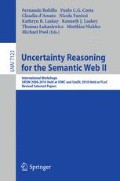Abstract
This paper presents Pronto—the first probabilistic Description Logic (DL) reasoner capable of processing knowledge bases containing about a thousand of probabilistic axioms. We describe in detail the novel probabilistic satisfiability (PSAT) algorithm which lies at the heart of Pronto’s architecture. Its key difference from previously developed (propositional) PSAT algorithms is its interaction with the underlying DL reasoner which, first, enables applying well-known linear programming techniques to non-propositional PSAT and, second, is crucial to scaling with respect the amount of classical (non-probabilistic) knowledge. The latter is the key feature for dealing with probabilistic extensions of existing large ontologies. Finally we present the layered architecture of Pronto and demonstrate the experimental evaluation results on randomly generated instances of non-propositional PSAT.
This work has been carried out when the first author was a doctoral student at the University of Manchester, UK.
Access this chapter
Tax calculation will be finalised at checkout
Purchases are for personal use only
Preview
Unable to display preview. Download preview PDF.
References
Lukasiewicz, T.: Expressive probabilistic description logics. Artificial Intelligence 172(6-7), 852–883 (2008)
Nilsson, N.J.: Probabilistic logic. Artificial Intelligence 28(1), 71–87 (1986)
Halpern, J.Y.: An analysis of first-order logics of probability. Artificial Intelligence 46, 311–350 (1990)
Bacchus, F.: Representing and reasoning with probabilistic knowledge. MIT Press (1990)
Cozman, F.G., de Campos, C.P., da Rocha, J.C.F.: Probabilistic logic with independence. International Journal of Approximate Reasoning 49(1), 3–17 (2008)
Hansen, P., Perron, S.: Merging the local and global approaches to probabilistic satisfiability. International Journal of Approximate Reasoning 47(2), 125–140 (2008)
Klinov, P.: Practical Reasoning in Probabilistic Description Logic. PhD thesis, The University of Manchester (2011)
Klinov, P., Parsia, B., Picado-Muiño, D.: The consistency of the medical expert system CADIAG-2: A probabilistic approach. Journal of Information Technology Research 4(1), 1–20 (2011)
Horrocks, I., Kutz, O., Sattler, U.: The even more irresistible \(\mathcal{SROIQ}\). In: Knowledge Representation and Reasoning, pp. 57–67 (2006)
Lutz, C., Sattler, U., Tendera, L.: The complexity of finite model reasoning in description logics. Information and Computation 199(1-2), 132–171 (2005)
Klinov, P., Parsia, B.: A Hybrid Method for Probabilistic Satisfiability. In: Bjørner, N., Sofronie-Stokkermans, V. (eds.) CADE 2011. LNCS, vol. 6803, pp. 354–368. Springer, Heidelberg (2011)
Dantzig, G.B., Wolfe, P.: Decomposition principle for linear programs. Operations Research 8, 101–111 (1960)
Chvátal, V.: Linear programming. A Series of Books in the Mathematical Sciences. W.H. Freeman and Company, New York (1983)
Hooker, J.N.: Quantitative approach to logical reasoning. Decision Support Systems 4, 45–69 (1988)
Sirin, E., Parsia, B., Grau, B.C., Kalyanpur, A., Katz, Y.: Pellet: A practical OWL-DL reasoner. Journal of Web Semantics 5(2), 51–53 (2007)
Lynce, I., Silva, J.P.M.: On computing minimum unsatisfiable cores. In: International Conference on Theory and Applications of Satisfiability Testing (2004)
Horridge, M., Parsia, B., Sattler, U.: Laconic and Precise Justifications in OWL. In: Sheth, A.P., Staab, S., Dean, M., Paolucci, M., Maynard, D., Finin, T., Thirunarayan, K. (eds.) ISWC 2008. LNCS, vol. 5318, pp. 323–338. Springer, Heidelberg (2008)
Grau, B.C., Horrocks, I., Kazakov, Y., Sattler, U.: Modular reuse of ontologies: Theory and practice. Journal of Artificial Intelligence Research 31, 273–318 (2008)
Sattler, U., Schneider, T., Zakharyaschev, M.: Which kind of module should I extract? In: International Workshop on Description Logic (2009)
Reiter, R.: A theory of diagnosis from first principles. Artificial Intelligence 32, 57–95 (1987)
Georgakopoulos, G.F., Kavvadias, D.J., Papadimitriou, C.H.: Probabilistic satisfiability. Journal of Complexity 4(1), 1–11 (1988)
Kavvadias, D.J., Papadimitriou, C.H.: A linear programming approach to reasoning about probabilities. Annals of Mathematics and Artificial Intelligence 1, 189–205 (1990)
Hooker, J.: A mathematical programming model for probabilistic logic. Working Paper 05-88-89, Graduate School of Industrial Administration, Carnegie Mellon University, Pittsburgh, PA 15213 (1988)
Jaumard, B., Hansen, P., de Aragão, M.P.: Column generation methods for probabilistic logic. In: Integer Programming and Combinatorial Optimization Conference, pp. 313–331 (1990)
Jaumard, B., Hansen, P., de Aragão, M.P.: Column generation methods for probabilistic logic. INFORMS Journal on Computing 3(2), 135–148 (1991)
Hansen, P., Jaumard, B., Nguetsé, G.B.D., de Aragão, M.P.: Models and algorithms for probabilistic and Bayesian logic. In: International Joint Conference on Artificial Intelligence, pp. 1862–1868 (1995)
Hansen, P., Jaumard, B., de Aragão, M.P., Chauny, F., Perron, S.: Probabilistic satisfiability with imprecise probabilities. International Journal of Approximate Reasoning 24(2-3), 171–189 (2000)
Coletti, G., Gilio, A., Scozzafava, R.: Comparative probability for conditional events: a new look through coherence. Theory and Decision 35, 237–258 (1993)
Ognjanović, Z., Midić, U., Kratica, J.: A Genetic Algorithm for Probabilistic SAT Problem. In: Rutkowski, L., Siekmann, J.H., Tadeusiewicz, R., Zadeh, L.A. (eds.) ICAISC 2004. LNCS (LNAI), vol. 3070, pp. 462–467. Springer, Heidelberg (2004)
Ognjanović, Z., Midić, U., Mladenović, N.: A Hybrid Genetic and Variable Neighborhood Descent for Probabilistic SAT Problem. In: Blesa, M.J., Blum, C., Roli, A., Sampels, M. (eds.) HM 2005. LNCS, vol. 3636, pp. 42–53. Springer, Heidelberg (2005)
Jovanovic, D., Mladenovic, N., Ognjanovic, Z.: Variable neighborhood search for the probabilistic satisfiability problem. In: International Conference on Metaheuristics, pp. 557–562 (2005)
de Souza Andrade, P.S., da Rocha, J.C.F., Couto, D.P., da Costa Teves, A., Cozman, F.G.: A toolset for propositional probabilistic logic. In: Encontro Nacional de Inteligencia Artificial, 1371–1380 (2007)
Klinov, P., Parsia, B.: Probabilistic modeling and OWL: A user oriented introduction into P-\(\mathcal{SHIQ}\)(D). In: OWL: Experiences and Directions (2008)
Castano, S., Ferrara, A., Lorusso, D., Näth, T.H., Möller, R.: Mapping Validation by Probabilistic Reasoning. In: Bechhofer, S., Hauswirth, M., Hoffmann, J., Koubarakis, M. (eds.) ESWC 2008. LNCS, vol. 5021, pp. 170–184. Springer, Heidelberg (2008)
Author information
Authors and Affiliations
Editor information
Editors and Affiliations
Rights and permissions
Copyright information
© 2013 Springer-Verlag Berlin Heidelberg
About this paper
Cite this paper
Klinov, P., Parsia, B. (2013). Pronto: A Practical Probabilistic Description Logic Reasoner. In: Bobillo, F., et al. Uncertainty Reasoning for the Semantic Web II. URSW URSW URSW UniDL 2010 2009 2008 2010. Lecture Notes in Computer Science(), vol 7123. Springer, Berlin, Heidelberg. https://doi.org/10.1007/978-3-642-35975-0_4
Download citation
DOI: https://doi.org/10.1007/978-3-642-35975-0_4
Publisher Name: Springer, Berlin, Heidelberg
Print ISBN: 978-3-642-35974-3
Online ISBN: 978-3-642-35975-0
eBook Packages: Computer ScienceComputer Science (R0)

